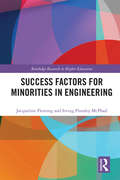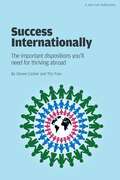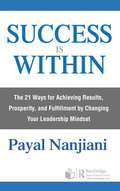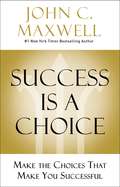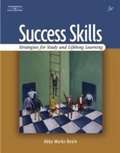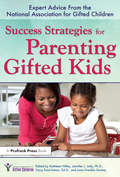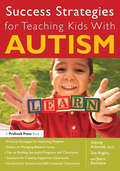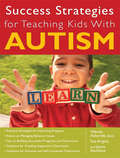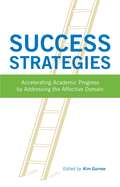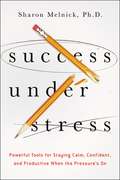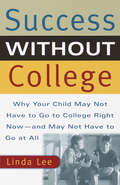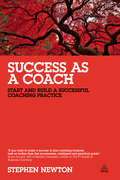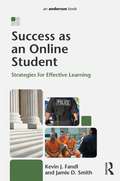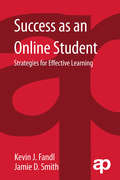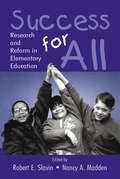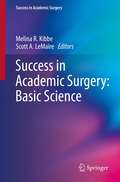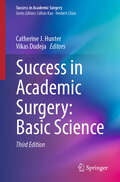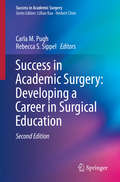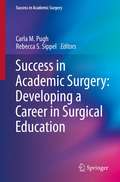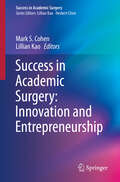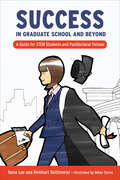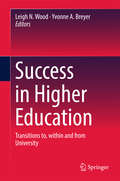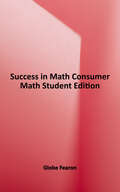- Table View
- List View
Success Factors for Minorities in Engineering (Routledge Research in Higher Education)
by Jacqueline Fleming Irving Pressley McPhailThis book aims to isolate specific success factors for underrepresented minorities in undergraduate engineering programs. Based on a three-phase study spearheaded by the National Action Council for Minorities in Engineering, the findings include evidence that hands-on exposure to problem-based courses, research, and especially internships are powerful catalysts for engineering success, and that both college adjustment and academic skills matter, in varying degrees, to minority success. By encompassing an unusually large number and range of programs, this research adds to the evidence base for the importance of hands-on exposure to the work of engineering.
Success Internationally: The Important Dispositions You'll Need for Thriving Abroad
by Steve CarberWhat are the dispositions of people who work successfully in an international milieu? This guiding question serves to unify the themes of the book, and each chapter hearkens to it. Sub-questions include "how can these dispositions be taught and assessed, both to youth and to adults?" This book helps prepare readers for even greater success in international milieus or expatriate assignments. In discussing positive dispositions such as open-mindedness, adaptability, and flexibility, the authors are implicitly addressing self-improvement, though not in the style of a self-help book. The book is forward-minded about preparing today's students, young professionals, and fellow citizens for a world that does not yet exist but that we know will be increasingly international.
Success Internationally: The Important Dispositions You'll Need for Thriving Abroad
by Steve CarberWhat are the dispositions of people who work successfully in an international milieu? This guiding question serves to unify the themes of the book, and each chapter hearkens to it. Sub-questions include "how can these dispositions be taught and assessed, both to youth and to adults?" This book helps prepare readers for even greater success in international milieus or expatriate assignments. In discussing positive dispositions such as open-mindedness, adaptability, and flexibility, the authors are implicitly addressing self-improvement, though not in the style of a self-help book. The book is forward-minded about preparing today's students, young professionals, and fellow citizens for a world that does not yet exist but that we know will be increasingly international.
Success Is Within: The 21 Ways for Achieving Results, Prosperity, and Fulfillment by Changing Your Leadership Mindset
by Payal Nanjiani"Payal has beautifully defined success as to ‘reach where you want from where you are.’ She emphasizes rightful karma or focused execution to keep you on the right path so that you are always walking in a direction that takes you toward your goal." Dr. Arun Arora, CEO, EDVANCE "This book is full of practical tips on how to become a successful leader and the best part is Payal has narrated it wonderfully with appropriate fables and relevant case studies…. Her entrepreneurial attitude and impactful wisdom are commendable and evident in the IPL series." Swapna Hari, Director, Cognizant "This book by Payal Nanjiani will join the best of business literature for emphasizing attitude as our biggest asset." Swami Mukundananda of Jagadguru Kripaluji Yog (JKYog) Institute Gathering insights from 20 years of the author’s executive coaching in the United States and abroad, this book presents 21 mindfulness strategies for business leaders, corporate heads, entrepreneurs, and professionals. During the author’s coaching sessions for business and corporate leaders and her trainings at corporations, mid-sized businesses, small businesses, and start-up organizations, she discovered that there is a wide gap between those who achieve success and those who do not. This gap indicates that there is still something significant missing in the business world. Success Is Within fills this gap by encouraging business professionals to "mind the mind." Written in accessible, easy-to-digest language, and targeted towards busy US business professionals who long for thought-leadership to boost their success, the book argues that success depends on changing one’s mindset in key ways. Each chapter focuses on one way to transform one’s mindset to achieve success. The union of these 21 ways provides a uniquely comprehensive program for leadership success in business and corporate careers. Drawing from a blend of Eastern and Western wisdom, the book blends true-life storytelling about the challenges of actual business professionals with insights drawn from traditional parables from classic "wisdom books" to inspire readers to think-through how to transform their mindsets. Ultimately, the book helps magnify one’s inner power: the power of one’s mind. The book calls on business professionals to unleash their "inner leader." When they recognize the power of their inner leader, they will become unstoppable.
Success Is a Choice: Make the Choices that Make You Successful
by John C. MaxwellAre you tired of not reaching your full potential? Do you feel you have the talent to succeed but are unappreciated and trapped?Based on his New York Time bestselling book, Beyond Talent, John Maxwell asks if you are tired of not reaching your full potential and feel you have the talent to succeed but are unappreciated and trapped. If this describes you, in Success Is a Choice, you can learn the right choices that lead to success from John Maxwell, the go-to-guru for business professionals across the globe. Take the next steps that successful people chose, including:Believing in themselvesFiring up their passionInitiating actionFocusing their energyCultivating good relationshipsEmbracing PracticeThe choices you make in addition to your talent make the greatest difference. With authentic examples and time-tested wisdom, Maxwell shares fourteen choices you need to make to live the life of your dreams. It&’s time to go beyond talent by making right choices that will help you really stand out.
Success Skills for High School, College, and Career
by Cary J. GreenWhat Every Parent (and Teen) Should Know About Study Skills For High School Students And College Success Skills <p><p> It's a lot of work to empower your teens to succeed in high school and prepare for college, let alone successfully raise your teens to be successful adults. You may even feel overwhelmed by the daunting task of giving your teens the advice and guidance they need. <p><p> Success Skills for High School, College, and Career (Revised Edition) is an empowering resource you can use to equip your teens with the leadership, soft skills, and academic success skills they need to succeed in the classroom and on the job, even if you are not an academic success expert or career coach. <p><p> Skills in time management, communication, collaboration, critical thinking, and problem solving are commonly referred to as soft skills. These skills work together with leadership and academic success skills to help your teen succeed in the classroom. And these skills are also highly valued by employers. <p><p> Think of it like this: equipping your teens with leadership, soft skills, and academic success skills while they are in high school will empower their success right now and will also prepare them for college and career success in the future.
Success Skills: Strategies for Study and Lifelong Learning
by Abby Marks-BealeSUCCESS SKILLS focuses on how to learn; thinking and communication skills; and technology and information management. Users learn success strategies required in today's academic and workplace environments. The five key areas of this text include: learning how to learn; becoming an active reader; listening, memory, and note-taking mastery; testing and critical thinking skills; and information gathering, research and writing skills. SUCCESS SKILLS positions learners to be successful in today's multifaceted workplace.
Success Strategies for Parenting Gifted Kids: Expert Advice From the National Association for Gifted Children
by Jennifer L. Jolly Tracy Ford Inman Joan Franklin Smutny Kathleen NillesWhen parents need guidance on raising gifted kids, they can turn to Success Strategies for Parenting Gifted Kids: Expert Advice From the National Association for Gifted Children. This collection of practical, dynamic articles from NAGC's Parenting for High Potential magazine:
Success Strategies for Teaching Kids With Autism
by Wendy Ashcroft Sue Argiro Joyce KeohaneAlthough an abundance of research exists on working with students with autism, teachers need the practical strategies in Success Strategies for Teaching Kids With Autism to build successful programs and services for kids with autism.The authors, seasoned classroom teachers and consultants for a large public school autism support program, look at ways teachers can apply best practices for teaching special needs students. They offer field-tested ideas for teachers to implement, covering topics such as managing difficult behaviors, teaching social skills, addressing communication difficulties, creating schedules, and organizing the classroom.The book includes a detailed section on using applied behavior analysis, providing practical examples for teachers to employ in their own classrooms in order to modify student behaviors and increase learning. Including teacher-friendly overviews of the educational needs of students with autism and ideal teaching methods, the book also provides reproducible materials and photographs that show the strategies in action.
Success Strategies for Teaching Kids With Autism
by Wendy AshcroftSuccess Strategies for Teaching Kids with Autism - Wendy Ashcroft, PhD, Sue Argiro, Joyce KeohaneThe perfect handbook for any teacher looking for proven solutions for helping children with autism succeedAlthough an abundance of research exists on working with students with autism, teachers need the practical strategies in Success Strategies for Teaching Kids With Autismto build successful programs and services for kids with autism. The authors, seasoned classroom teachers and consultants for a large public school autism support program, look at ways teachers can apply best practices for teaching special needs students on smaller budgets, tight schedules, and minimal materials. They offer more than 25 field-tested ideas for teachers to implement, covering topics such as managing difficult behaviors, teaching social skills, addressing language and communication difficulties, creating schedules, and organizing the classroom. Including teacher-friendly overviews of the educational needs of students with autism and ideal teaching methods, the book also provides reproducible materials that teachers can copy and use immediately in their classrooms, along with photographs and detailed graphics that show their strategies in action. Features proven advice and strategies from experienced special educatorsAddresses the three main areas of need for students with autism: language, social skills, and behavior managementOffers practical solutions to creating an autism-friendly classroomProvides a concise introduction to the educational needs of students with autismIncludes guidance for both inclusion and self-contained classroomsPrufrock Press offers award-winning products focused on gifted, advanced, and special needs learners. For more than 20 years, Prufrock has supported parents and teachers with a wide range of resources based on sound research. The average day of a parent or teacher of a gifted or special needs learner is filled with a thousand celebrations and challenges. Prufrock's goal is to provide practical solutions to those challenges-to provide readers with timesaving, research-based tools that allow them to spend less time on the challenges and more time on the celebrations. Prufrock Press' line of products features:Resources on parenting the special needs learnerSage advice on teaching in the inclusive classroomAdvanced learning tools for gifted children and inquisitive learnersCutting-edge information on innovative teaching approachesResources for college planning for gifted and special needs learnersPrufrock Press is committed to resources based on sound research. It has a senior advisory group composed of the top scholars in the field of education and psychology. All of the company's editors have graduate degrees in education or children's literature, and they all have classroom experience. In essence, when a reader holds a book by Prufrock Press, he or she knows that the information found in that book will be research-based and reflect agreed upon best practices in the field of education and child psychology.
Success Strategies: Accelerating Academic Progress by Addressing the Affective Domain
by Kim GurneeThe book presents fourteen success strategies in a concise format and helps students cultivate the mindset that focuses on growth.
Success Under Stress: Powerful Tools for Staying Calm, Confident, and Productive When the Pressure's On
by Sharon MelnickFrom overflowing priority lists to power-hungry colleagues to nagging parental guilt, stress is the defining characteristic of most of our lives. Real help is here an all-encompassing, stress-busting tool kit that goes far beyond breathing exercises and visualization techniques. Such one-size-fits-all methods are no match for the stressors we experience daily in our overcomplicated lives. Whether you have too many projects, your confidence is flagging, or you are clashing with a coworker, Success Under Stress provides a flexible array of strategies. You will learn how to: Adjust your perspective to see opportunity instead of obstacles Alter your physiology to get focused when overwhelmed, energized when exhausted, and calm when wired Change the problem to prevent the stress from returning All in all, Success Under Stress offers a veritable arsenal of magic bullet solutions hundreds of situation-specific, quick-acting tips for defusing stress and boosting roductivity. Complete with quizzes, examples, exercises, and more, this practical book helps you gain control, exude calmness and confidence amidst everyday chaos, and achieve the success you richly deserve.
Success Without College
by Linda LeeIf your child seems indecisive about college, don't read the riot act, read this landmark book instead. College is not the only alternative. A New York Times editor and concerned parent tells you why and helps you to find happy alternatives to starting college before your child is ready.
Success as a Coach
by Stephen NewtonWhat does it take to be a successful coach? Assuming that you already possess the right skills, characteristics and training then success simply lies in finding and winning clients that you can coach successfully. Personal fulfilment and profitable fee revenue will be direct results. Unfortunately this isn't as simple as it might seem. Success as a Coach is your complete guide to business development whether you're newly qualified or an experienced coach. It covers all the crucial factors that will help you build your clients and your business including: finding the right clients; extending your professional network; planning and running meetings; delivering value for the client; calculating fees; structuring and delivering sessions; structuring your business; strategic client leadership and systematically growing your business.Additional downloadable tools and templates will be available from www.successasacoach.com on publication.
Success as an Online Student: Strategies for Effective Learning
by Kevin J. Fandl Jamie D. SmithThis book presents concise guidance to make the online learning journey enjoyable, productive, and most of all, worthwhile.
Success as an Online Student: Strategies for Effective Learning
by Kevin J. Fandl Jamie D. SmithThis book is a practical guide for any student considering enrollment in, currently enrolled in, or recently graduated from an online course. The authors, both with substantial online teaching and learning experience as well as seasoned professionals, deliver concise guidance to make the online learning journey enjoyable, productive, and most of all, worthwhile. Major topics include how to identify the best online program; comparing online with traditional education programs; finding an ideal work-life balance; managing time and staying organized; how to form good habits to maximize your chances for success; getting the most out of an online learning environment; and using your online education to succeed in your career. As the singular guide to success as an online learner, this practical book serves as the essential desk reference for every online student.
Success for All: Research and Reform in Elementary Education
by Robert E. Slavin Nancy A. MaddenSuccess for All is a comprehensive reform model for elementary school that combines state-of-the-art curriculum, research-based instructional methods, assessments, and professional development with one-to-one tutoring, extensive family support services, and other strategies to ensure that every child is successful in the early grades and then builds on that success throughout the elementary years. Started in 1987, it is the most widely used of all reform designs. It is currently in about 1800 schools serving more than a million U.S. children, mostly in high-poverty schools. It is also the most extensively researched comprehensive reform program, with two dozen evaluations carried out in eight research institutions. Success for All: Research and Reform in Elementary Education is the first edited volume presenting research on Success for All in the U.S. and in five other countries for which the program has been adapted. This book presents a description of Success for All, an overall summary of all achievement studies, reviews of research, original presentations of new research, and discussions of the impacts and the implications of this research and dissemination for educational policy and practice in many arenas.
Success in Academic Surgery: Basic Science
by Melina R. Kibbe Scott A. LemaireCombining breadth of coverage with a portable format, this reference has been expertly prepared by Association for Academic Surgery members and guides readers through techniques in reviewing academic literature, laboratory work, statistics and ethical issues.
Success in Academic Surgery: Basic Science (Success in Academic Surgery)
by Catherine J. Hunter Vikas DudejaThis book advises the reader on the mechanics of starting a basic science research career as an academic surgeon. Written by established content experts, the chapters are both comprehensive and practical in their approach. The book includes a suggested timeline for the initial academic appointment, including how to setup and fund the laboratory and identifying appropriate scientific mentors and lab personnel. It also describes the application of basic and advanced research techniques, including animal models, flow cytometry, gene editing, tissue engineering, and microbiome analysis. Success in Academic Surgery: Basic Science is an essential guidebook for senior residents or fellows approaching their first academic appointment, young faculty in the process of establishing their research career, and more senior investigators interested in expanding their research horizons.
Success in Academic Surgery: Developing A Career In Surgical Education (Success in Academic Surgery #0)
by Rebecca S. Sippel Carla M. PughThis updated volume provides a guide on how to maximize the career and research opportunities available within surgical education. The book includes new chapters on opportunities to develop training in new surgical techniques, utilizing surgical coaching and video review for practice improvement, and getting promoted as a surgical educator. How to develop a research program in surgical education as well as offering guidance on applying for research grants, leadership positions, and other career enhancing opportunities are also covered. This book is relevant to medical students, surgical residents, young faculty, and others considering a career within surgical education.
Success in Academic Surgery: Developing a Career in Surgical Education
by Carla M Pugh Rebecca S. SippelSuccess in Academic Surgery: Developing a Career in Surgical Education is a unique and portable handbook that offers careers advice and guidance to medical students, surgical residents and others considering a career within surgery. Surgical education is a rapidly expanding area of surgical research and career interest, and as the Association for Academic Surgery (AAS) Fall Courses (www.aasurg.org) and International courses offer more and more specialty tracking there is a greater need for an accompanying textbook to supplement the material presented in the courses. Success in Academic Surgery: Developing a Career in Surgical Education expands on some of the important issues related to surgical education highlighted in the AAS courses by addressing key areas such as how to acquire the skills necessary for success in this field, how to develop a research program in surgical education as well as offering guidance on applying for research grants, among other things.
Success in Academic Surgery: Innovation and Entrepreneurship (Success in Academic Surgery)
by Mark S. Cohen Lillian KaoThis book provides a guide to innovation and entrepreneurship within academic surgery and details how these approaches can develop new technologies and programs that advance healthcare. The pathways, barriers, and opportunities for commercialization and entrepreneurship are identified and discussed in relation to licenses, start-ups, and obtaining funding. The book aims to help create a culture of innovation and entrepreneurship across academic medical centres around the world, with the belief that this can improve patient care. This book is relevant to surgeons of all disciplines, as well as medical students and researchers.
Success in Graduate School and Beyond: A Guide for STEM Students and Postdoctoral Fellows
by Nana Lee Reinhart ReithmeierSuccess in Graduate School and Beyond is designed to empower graduate students and postdoctoral fellows in STEM with practical tools, tips, and skill development strategies to plan and create their dream career pathway. Intended as a professional development course book, this balanced, self-reflective guide to workplace readiness is organized into five sections that support graduate student development: self-reflection, wellness, skills, networking, and planning for future success. Written in a conversational style, this guidebook includes clear learning outcomes based on the authors’ successful graduate professional development course at the University of Toronto. Covering increasingly important career subjects such as mentorships, transferrable skill development, emotional intelligence, and EDI, this guidebook solves a skills gap and builds core competencies demanded from industries and academia. Interspersed personal accounts from the authors about key topics and seven Alumni Career Profiles describing various career trajectories work to encourage self-awareness and promote essential skill development and networking proficiency. With this book, STEM students will be equipped with the abilities and tools to achieve success in graduate school and beyond.
Success in Higher Education
by Leigh N. Wood Yvonne A. BreyerThis book explores successful transition strategies to, within and from university for students from around the globe, with Macquarie University, a large Australian university, studied in depth. It addresses the meaning of success taking a variety of perspectives, including student, staff and employer views. The chapters present a series of initiatives that have proven to be successful in assisting students in developing their academic potential throughout university and beyond. The authors of the chapters use a variety of methodologies and approaches reflecting the diverse local contexts and requirements. These international perspectives demonstrate a triumph of practice that has led to the empowerment of individuals and groups. The approaches from twelve universities located in eight different countries stem directly from the coalface and provide many valuable lessons and tools that colleagues in the sector will be able to consider and adapt in their own contexts. Small interventions matter, from a mentor of a nervous student who goes on to achieve greatness, to the use of a curriculum design model that hooks a whole group of students into learning and achievement. This book covers both the small, individual victories and the larger scale strategies that support success. Contributions emanate from Australia, Bangladesh, India, China, New Zealand, United Kingdom, Canada, USA, Uruguay and South Africa.
Success in Math: Consumer Math (Success in Math Series)
by Globe FearonThis book helps students with varying learning styles master basic math concepts and prepares them for success on math competency tests. Student Texts This five-book softcover series breaks down core math concepts into short, manageable lessons that assume little background knowledge and are introduced in real-life contexts. In addition, chapter opener vocabulary lists and a glossary prove valuable for English language learners with below- or at-level math skills. Teacher's resources include answer Keys, as well as error analysis notes, alternative strategies for varied learning styles, problem-solving strategies, ESL notes, cooperative learning strategies, and reproducible masters are provided. - Helps students with varying learning styles master the basic math concepts they need to meet rigorous high school math and testing requirements. - Introduces students to the working world by presenting real-world examples and problems. - Supports independent learning with instruction, exercises, and partial Answer Keys.
